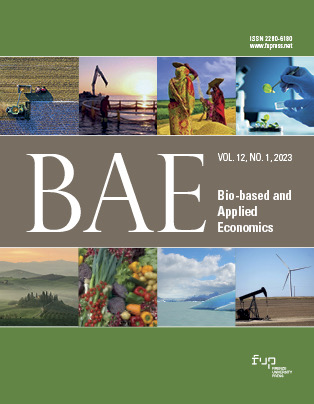A complex web of interactions: Personality traits and aspirations in the context of smallholder agriculture
Published 2023-05-15
Keywords
- Big Five,
- aspirations,
- smallholder agriculture,
- rural livelihoods,
- Kenya
How to Cite
Copyright (c) 2023 Luzia Deißler, Kai Mausch, Alice Karanja, Stepha McMullin, Ulrike Grote

This work is licensed under a Creative Commons Attribution 4.0 International License.
Funding data
-
Deutsche Gesellschaft für Internationale Zusammenarbeit
-
Bundesministerium für Wirtschaftliche Zusammenarbeit und Entwicklung
Grant numbers 81260863 -
International Fund for Agricultural Development
Grant numbers IFAD Grant Number: 2000001413
Abstract
Some recent research began to shift the focus of development efforts away from income and yield to more diverse concepts that consider people’s intrinsic drivers and values, such as aspirations and personality traits. We aim to contribute to the literature by exploring the connections between intrinsic drivers. Hence, we analyze if and how the formation of aspirations relates to personality traits against the background of different socio-economic household characteristics. This research will help us provide practical insights for the successful design of development projects specifically tailored to the unique needs and aspirations of individuals and households. Our analyses are based on a primary data set of 272 smallholder farming households in rural and peri-urban Kenya. Structural Equation Modeling (SEM) results show a significant positive correlation of personality traits with aspirations (openness; extraversion; conscientiousness), indicating that personality structures indeed correlate with the formation of aspirations in a rural, agricultural context. Furthermore, we show that household and respondent characteristics are associated with differences in education, income, and social aspirations. Considering intrinsic factors for the prediction of human behavior has the potential to increase the efficiency of agricultural development projects and policies. We conclude that a contextualized understanding of aspirations can provide useful insights for development practice aiming to support smallholder farmers’ livelihoods.






